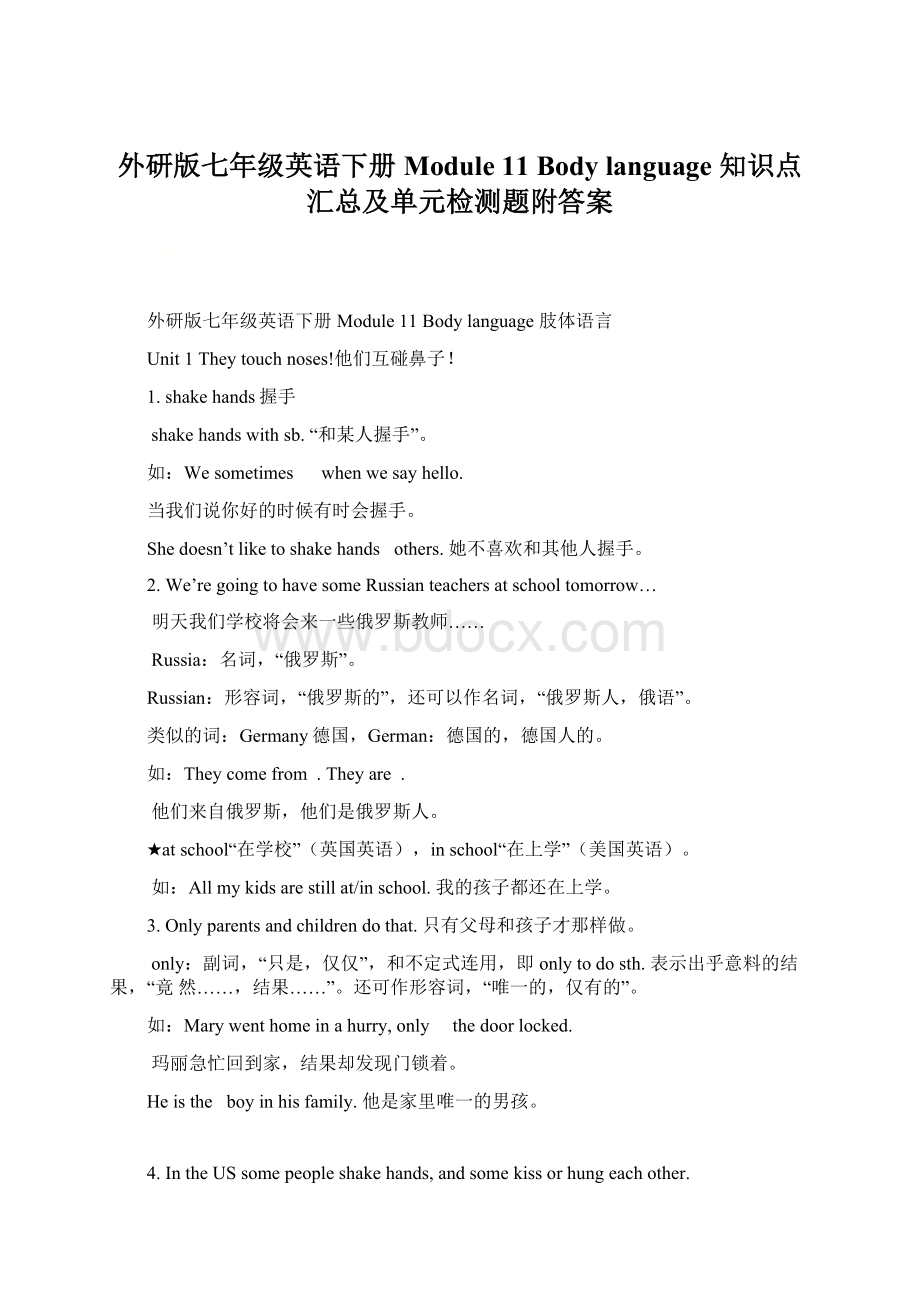外研版七年级英语下册Module 11 Body language 知识点汇总及单元检测题附答案Word文件下载.docx
《外研版七年级英语下册Module 11 Body language 知识点汇总及单元检测题附答案Word文件下载.docx》由会员分享,可在线阅读,更多相关《外研版七年级英语下册Module 11 Body language 知识点汇总及单元检测题附答案Word文件下载.docx(15页珍藏版)》请在冰豆网上搜索。

3.Onlyparentsandchildrendothat.只有父母和孩子才那样做。
only:
副词,“只是,仅仅”,和不定式连用,即onlytodosth.表示出乎意料的结果,“竟然……,结果……”。
还可作形容词,“唯一的,仅有的”。
Marywenthomeinahurry,onlythedoorlocked.
玛丽急忙回到家,结果却发现门锁着。
Heistheboyinhisfamily.他是家里唯一的男孩。
4.IntheUSsomepeopleshakehands,andsomekissorhungeachother.
在美国,一些人握手,一些人亲吻或者互相拥抱。
eachother“相互,彼此”。
Weshouldlearnfrom.
我们应该互相学习。
Unit1练习答案:
1.shake
hands;
with;
2.Russia;
Russians;
3.tofind;
only;
4.eachother.
Unit2Herearesomewaystowelcomethem.这是欢迎他们的一些方式
1.…butdon’tstandtooclosetoNorthAmericans!
……但是不要和北美人站得太近!
too“太……”,too…to…“太……而不能……”,too为副词,后接形容词或副词,to为不定式符号,后接动词原形。
Heisyounggotoschool.他太小了以致不能去上学。
=Heissoyoungthathecan’tgotoschool.
=Heisnotoldenoughtogotoschool.
2.Chinesegirlsoftenwalkarminarmwiththeirfriends.
中国女孩子行走时经常和她们的朋友臂挽臂。
arminarm“臂挽臂地”。
Thetwogirlsaregoodfriends.Theyliketowalk.
这两个女孩是好朋友,她们喜欢臂挽臂地走路。
链接:
handinhand手挽手shouldertoshoulder肩并肩
3.…soyoucan’tmoveaway!
……所以你不能动!
moveaway“搬开,搬走,离开”。
moveto+地点名词,表示“搬到……”。
Movethesestones,please.请把这些石头搬开。
TommovedLondonlastweek.汤姆上周搬到伦敦去了。
4.ButinBritainmanypeopledon’tlikeotherpeopletotouchthematall.
但是在英国许多人一点儿也不喜欢别人碰触他们。
not…atall“根本不,全然不”。
notatall“不用谢,别客气”,用来回应对方感谢时的用语。
Idon’tlikehim.我一点都不喜欢他。
——Thankyouforhelpingme.谢谢你帮助我。
——Notatall.不用谢。
5.…itisn’tpolitetolookatpeoplewhenyoutalk…
……你说话的时候看着别人是不礼貌的……
polite:
形容词,“有礼貌的”,反义词是impolite“不礼貌的”或rude“粗鲁的”。
副词形式是politely,名词形式是politeness。
It'
s
not
to
interrupt
a
speaker.打断人的谈话是不礼貌的。
6.That’seasy,wavetosaygoodbye.那很简单,挥手说再见。
wave:
动词,“挥手(致意)”,wavetosb.“向某人挥手”。
You
have
them!
你得向他们挥挥手!
7.Infact,it’sveryrude!
事实上,那是很粗鲁的!
fact:
名词,“事实,细节”,infact“事实上”。
Idon’tknowhername.事实上我不知道她的名字。
★rude:
形容词,“粗鲁的”,反义词是polite,副词形式是rudely,名词形式为rudeness。
It’stopointatothers.指着别人是粗鲁的。
Unit2练习答案:
1.too;
to;
2.arminarm;
3.away;
4.atall;
5.polite;
6.wave
7.Infact;
rude.
Unit3Languageinuse语言应用
1.Beontime.要准时。
ontime“准时,按时”。
intime“及时”。
sgoodtogotoschooltime.按时上学是好的。
Youshouldreturnthebooktime.你应该及时还书。
2.kissthreetimes亲吻三次
time:
此处作可数名词,“次数”,“一次”为once,“两次”为twice,“三次或三次以上”用“基数词+times”,提问次数用howmanytimes。
——timeshaveyoureadthebook?
这本书你看过几次了?
——.两次。
IhavebeentoAmericafor.我去过美国四次。
3.Childrenandyoungpeoplebowlowerwhentheygreetolderpeople.
当孩子们和年轻人向年纪大的人问候时,身体会弯低一点。
low:
形容词,“低的”。
反义词是high“高的”。
Hisvillageliesamonghills.我们的村庄坐落于低矮的小山间。
Theystillhavetoliveonveryincomes.他们还得靠微薄的收入过日子。
4.It’sawayofbeingpoliteandshowingrespect.这是一种礼貌且显示尊重的方式。
show:
此处作及物动词,“展示;
给……看”。
showsth.tosb.=showsb.sth.“把……展示给某人看”。
Pleaseshowmeyourticket.=Pleaseyourticketme.
请把你的票给我看看。
5.语法专题:
祈使句
一、祈使句用以表达命令,要求,请求,劝告,叮嘱,希望,禁止等。
祈使句具有以下特点:
①祈使句一般没有主语,说话的对象都是第二人称“你”或“你们”,所以也可以理解为省略了主语you;
②祈使句以动词原形开头,无时态和数的变化;
③祈使句的否定形式是在动词原形前加don’t;
④在表达请求时,可以加上please;
表达比较强烈的语气时,可以用感叹号。
二、祈使句的类型:
1)祈使句有两种类型,一种是以动词原形开头,在动词原形之前加do(但只限于省略
第二人称主语的句子)。
Takethisseat.坐这儿。
Dobecareful.务必小心。
★否定结构:
Don’tmove.不准动。
Don’tbelate.不要迟到。
2)第二种祈使句以let开头。
Let的反意疑问句:
a.Let’s包括说话者。
Let’shaveanothertry,shallwe/shan’twe?
=Shallwehaveanothertry?
我们再试一次,如何?
b.Letus不包括说话者。
Letushaveanothertry,willyou/won’tyou?
=Willyoupleaseletushaveanothertry?
你让我们再试一次,好吗?
Let’snottalkofthatmatter.不要谈这件事。
Letusnottalkofthatmatter.你不要让我们谈这件事。
【练习导航】
Ⅰ.根据汉语意思完成下列英语句子,每空一词。
1.这边请!
__________,please!
2.我来帮你吧。
________helpyou.
3.我们休息一下吧。
__________arest.
4.让她走吧。
__________leave.
5.要永远记住那个可怕的日子。
Always_____thatterribleday.
6.务必告诉他这个消息!
Do_____himthenews!
Ⅱ.单项选择
()7._____thiskindofpeach,andyouwilllikeit.
A.TotryB.TryingC.TryD.Tried
()8._____theradio,please.Thebabyissleepingnow.
A.NotturnonB.Don’tturnon
C.NotturndownD.Don’tturndown
()9.—Pleasebringyourhomeworktoschooltomorrow,Steven.
—OK,I_____.
A.willB.won’tC.doD.don’t
()10.—Peter,don’tsteponthegrass.
—______.
A.Itdoesn’tmatterB.Ican’tdoit
C.Don’tworryD.Sorry,Iwon’tdoitagain
()11.—Remembertoaskhertocallmeback.
—______.
A.NevermindB.That’sright
C.UptoyouD.Allright
()12.—Let’sgooutandenjoythesunshine.
——______.It’sboringtostayathome.
A.SoundsgreatB.Notatall
C.ForgetitD.Noway
()13.—______lateforschoolagain,Tim!
—Sorry,IpromisethatI______.
A.Don’t;
won’tB.Don’tbe;
won’t
C.Don’tbe;
don’tD.Don’t;
will
()14.Boysandgirls,______upyourhandsifyouwanttogoforapicnicthisweekend.
A.puttingB.toputC.putD.puts
【指点迷津】
◆肯定结构的祈使句常以谓语动词原形开头。
◆否定结构的祈使句常在谓语动词原形前加上Never或Don’t。
◆以let引导的祈使句结构,有以下几种情况:
1.“Letme+动词原形”,意为“请让我……”。
2.“Let’s+动词原形”,意为“让我们……”,表示建议或请求。
3.“Let+第三人称作宾语+动词原形”,意为“让……”,表示愿望、命令或允许。
◆在开头的动词原形前加Do(务必)或Always(永远),表示强调。
Dowritetousoften!
务必经常给我们写信。
Unit3练习答案:
1.on;
in;
2.Howmany;
Twice;
fourtimes;
3.low;
low;
4.show;
to.
【练习导航】参考答案:
Ⅰ.1.Thisway2.Letme3.Let’shave4.Lether5.remember6.tell
Ⅱ.7-10CBAD11-14DABC
外研版七年级英语下册MODULE11Bodylanguage检测题
(时间:
60分钟;
满分:
100分)
一、听力测试(满分10分)
A.听句子,选择恰当的答语。
(每小题1分,满分5分)
1.A.You’reright.B.Oh,youshouldbeontime.C.Whatapity!
2.A.Idon’twanttoeatdinner.B.Supperisreadynow.C.Wewillcookitallbyourselves.
3.A.Veryfunny.B.Reallydelicious.C.Ihadtwobowls.
4.A.Sorry,Iwon’tdothatanymore.B.Iliketoeatapples.C.Icangiveyousome.
5.A.They’reshakinghands.B.TheywenttoIndia.C.Theytouchnoses.
B.听短文,选择正确答案。
6.oftenask“Whereareyougoing?
”whentwofriendsmeetinthestreet.
A.AmericansB.JapaneseC.Chinese
7.HowwillAmericansfeelifyouaskthem“Whereareyougoing?
”
A.They’llfeelhappy.B.They’llfeelsurprised(惊讶的).C.They’llfeelexcited.
8.Whatdoesthequestion“Haveyouhadyourmeal?
”meaninAmericans’eyes?
A.Theythinkitisaninvitation(邀请).
B.Theythinkitisagreeting.
C.Theythinkitisanintroduction.
9.WhichofthefollowingwillNOTbeusedasagreetinginAmerica?
A.Howareyou?
B.Hello!
C.Howoldareyou?
10.Whatdoesthespeakermainlywanttotellus?
A.Moreforeignlanguagesshouldbelearnt.
B.Differentcountrieshavedifferentcustoms(风俗).
C.Somequestionscanonlybeaskedbythepolice.
二、单项填空(每小题1.5分,满分15分)
11.isveryimportanttolearnhowtoaskforhelppolitely.
A.ThatB.ThisC.HeD.It
12.inthereadingroom.
A.NottalkB.NottalkingC.Don’ttalkD.Don’ttalking
13.Someparentsdon’tliketheirchildrencomputergames.
A.toplayB.toplayingC.playD.plays
14.—Ican’tfindmywallet.
—Don’tworry.Itmustbeinyourroom.
A.anywhereB.somewhereC.nowhereD.everywhere
15.Idon’tlikebananasatall.Ieatthem.
A.alwaysB.oftenC.usuallyD.never
16.more,andyou’llimprove(提高)yourspokenEnglish.
A.SpeakB.SpeaksC.SpeakingD.Tospeak
17.—Mark,pleasedon’tplaybasketballontheroad.It’sverydangerous.
—.Iamgoinghomeatonce.
A.HaveagreattimeB.Sorry,Iwon’tdothat
C.I’dliketoD.OK,withpleasure
18.InChina,peopleshakehandseachotherwhentheymeet.
A.amongB.inC.forD.with
19.ImyCDplayereverywhere,butIcouldn’tfindit.
A.lookedforB.lookedupC.lookedatD.lookedover
20.Bequiet,please.Thestudentsaclassnow.
A.haveB.hadC.arehavingD.werehaving
三、完形填空(每小题1.5分,满分15分)
Aroundtheworld,peoplehavedifferentideasaboutwhatgoodmannersare.
Whenyougotorestaurantsindifferentpartsoftheworld,it’s21toknowtherightandwrongthingstodo.Forexample,inChinait’sOKto22alotofnoiseinarestaurant.Infact,ifarestaurantisn’t23youmaythinkthere’ssomethingwrongwithit.However,inmanywestern24,restaurantsarequietplaces.Ifatableistooloud,25peoplewhoareeatingtheremightevencomplain(抱怨)totheowneroftherestaurant.
Payingthebill(账单)isalsodifferentfromcountrytocountry.InChina,onepersonusuallypaysfor26.Inwesterncountries,onepersonpaysifheorsheisentertainingclients,but27friendseattogether,theyusuallysharethecost.Thisiscalled“goingDutch(均摊费用)”.Also,whenwesternerspaythebill,theyusuallyleavesomemoneyforthe28.Thisiscalled“leavingatip”.Leavingatipisthoughttobe29.IntheUS,it’scommon(常见的)toleavetipsof10%,15%,or20%ofthebill,whichisdecidedbyhowgoodtheserviceis.Goodwaiterscanmakealotofmoney!
Thewaypeopleeatfoodisdifferentintheworld,butyoucan30thesamekindoffoodinmanycountries.ChineseandItalianfood,forexample,arepopularallovertheworld.
21.A.popularB.difficultC.importantD.enjoyable
22.A.causeB.keepC.hearD.make
23.A.noisyB.friendlyC.luckyD.polite
24